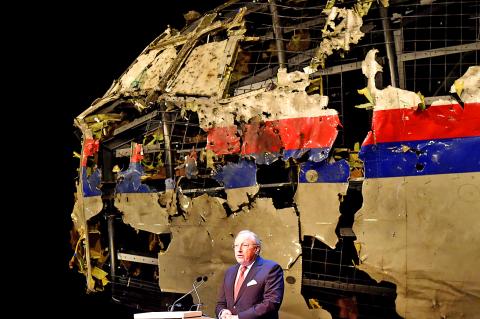Malaysia Airlines Flight 17 was shot down over eastern Ukraine by a Russian-made Buk missile, the Dutch Safety Board said yesterday in its final report on the crash on July 17 last year that killed all 298 people on board.
The long-awaited findings of the board, which was not empowered to address questions of responsibility, did not specify who launched the missile.
“A 9n314m warhead detonated outside the aeroplane to the left side of the cockpit. This fits the kind of warhead installed in the Buk surface-to-air missile system,” safety board head Tjibbe Joustra said, presenting the report.

Photo: AFP
Russia had disputed the type of missile used, he added.
At a meeting earlier yesterday with victims’ families, Joustra said passengers who were not killed by the impact of the missile would have been rendered unconscious by the sudden decompression of the aircraft and a lack of oxygen at 33,000 feet (10,000m).
Joustra was speaking at the Gilze-Rijen military base, where the flight cabin and business class section of the Boeing 777 have been assembled painstakingly from wreckage brought back from Ukraine.
The board also found that Ukraine had reason to close airspace over the conflict zone, and that the 61 airlines that had continued flying there should have recognized the potential danger.
It recommended international aviation rules be changed to force operators to be more transparent about their choice of routes.
The missile’s Russian maker presented its own report hours earlier, trying to clear Russia-backed separatists who controlled the area, or Russia, of any involvement in the crash.
The Dutch investigators said the missile exploded less than 1m from the MH17 cockpit, killing three crew members in the cockpit and breaking off the front of the plane. The aircraft broke up in the air and crashed over a large area controlled by rebel separatists who had been fighting government troops there since April last year.
The investigators unveiled a ghostly reconstruction of the forward section of MH17. Some of the nose, cockpit and business class of the Boeing 777 were rebuilt from fragments of the aircraft recovered from the crash scene and flown to Gilze-Rijen air base in southern Netherlands.
The Russian state-controlled Almaz-Antey arms-maker contended said a draft of the Dutch report found the plane was shot down by a Buk missile warhead, but that it conducted two experiments — in one of which a Buk missile was detonated near the nose of an airplane similar to a 777 — that contradict that conclusion.

A magnitude 7.0 earthquake struck off Yilan at 11:05pm yesterday, the Central Weather Administration (CWA) said. The epicenter was located at sea, about 32.3km east of Yilan County Hall, at a depth of 72.8km, CWA data showed There were no immediate reports of damage. The intensity of the quake, which gauges the actual effect of a seismic event, measured 4 in Yilan County area on Taiwan’s seven-tier intensity scale, the data showed. It measured 4 in other parts of eastern, northern and central Taiwan as well as Tainan, and 3 in Kaohsiung and Pingtung County, and 2 in Lienchiang and Penghu counties and 1

FOREIGN INTERFERENCE: Beijing would likely intensify public opinion warfare in next year’s local elections to prevent Lai from getting re-elected, the ‘Yomiuri Shimbun’ said Internal documents from a Chinese artificial intelligence (AI) company indicated that China has been using the technology to intervene in foreign elections, including propaganda targeting Taiwan’s local elections next year and presidential elections in 2028, a Japanese newspaper reported yesterday. The Institute of National Security of Vanderbilt University obtained nearly 400 pages of documents from GoLaxy, a company with ties to the Chinese government, and found evidence that it had apparently deployed sophisticated, AI-driven propaganda campaigns in Hong Kong and Taiwan to shape public opinion, the Yomiuri Shimbun reported. GoLaxy provides insights, situation analysis and public opinion-shaping technology by conducting network surveillance

‘POLITICAL GAME’: DPP lawmakers said the motion would not meet the legislative threshold needed, and accused the KMT and the TPP of trivializing the Constitution The Legislative Yuan yesterday approved a motion to initiate impeachment proceedings against President William Lai (賴清德), saying he had undermined Taiwan’s constitutional order and democracy. The motion was approved 61-50 by lawmakers from the main opposition Chinese Nationalist Party (KMT) and the smaller Taiwan People’s Party (TPP), who together hold a legislative majority. Under the motion, a roll call vote for impeachment would be held on May 19 next year, after various hearings are held and Lai is given the chance to defend himself. The move came after Lai on Monday last week did not promulgate an amendment passed by the legislature that

Taiwan is gearing up to celebrate the New Year at events across the country, headlined by the annual countdown and Taipei 101 fireworks display at midnight. Many of the events are to be livesteamed online. See below for lineups and links: Taipei Taipei’s New Year’s Party 2026 is to begin at 7pm and run until 1am, with the theme “Sailing to the Future.” South Korean girl group KARA is headlining the concert at Taipei City Hall Plaza, with additional performances by Amber An (安心亞), Nick Chou (周湯豪), hip-hop trio Nine One One (玖壹壹), Bii (畢書盡), girl group Genblue (幻藍小熊) and more. The festivities are to